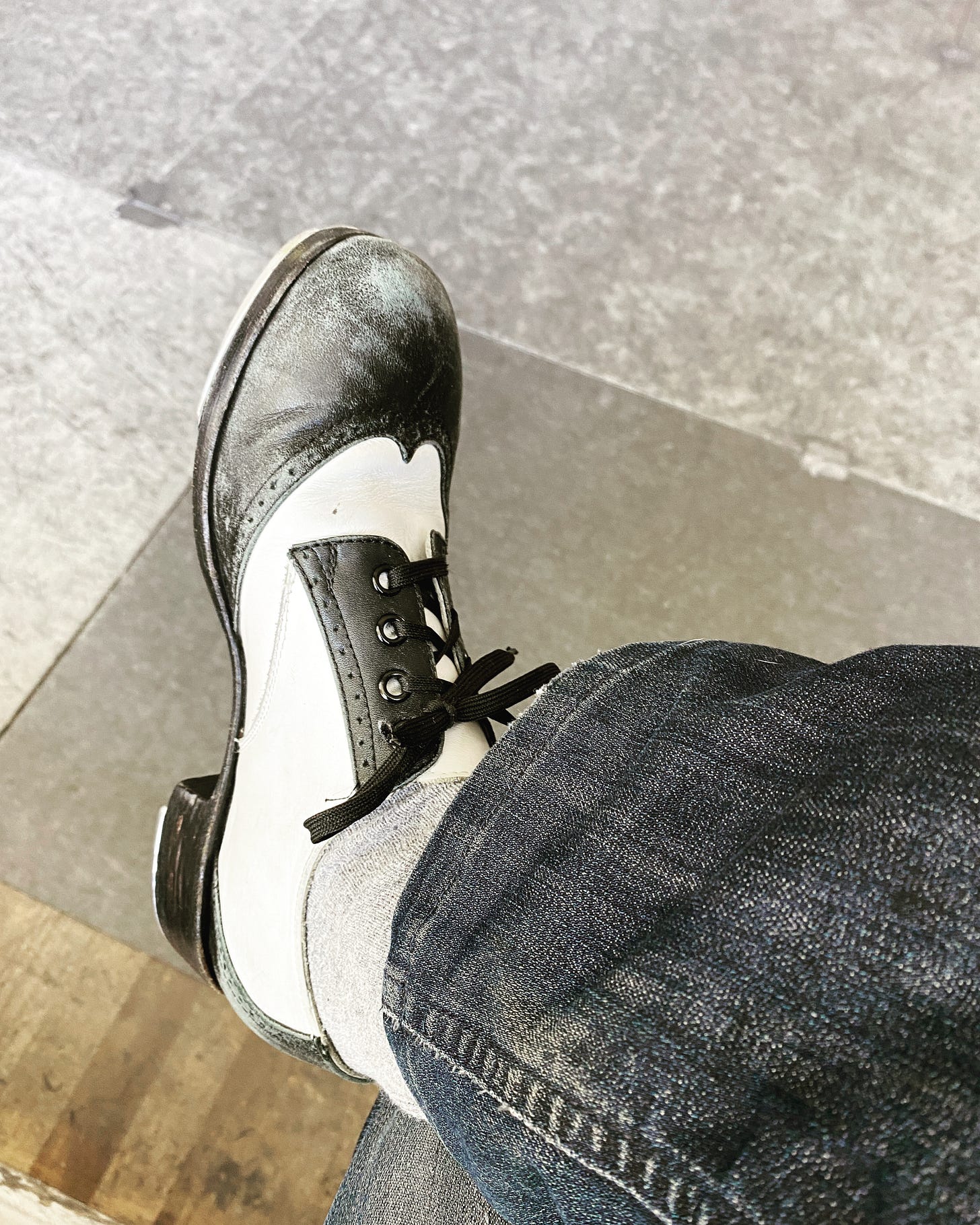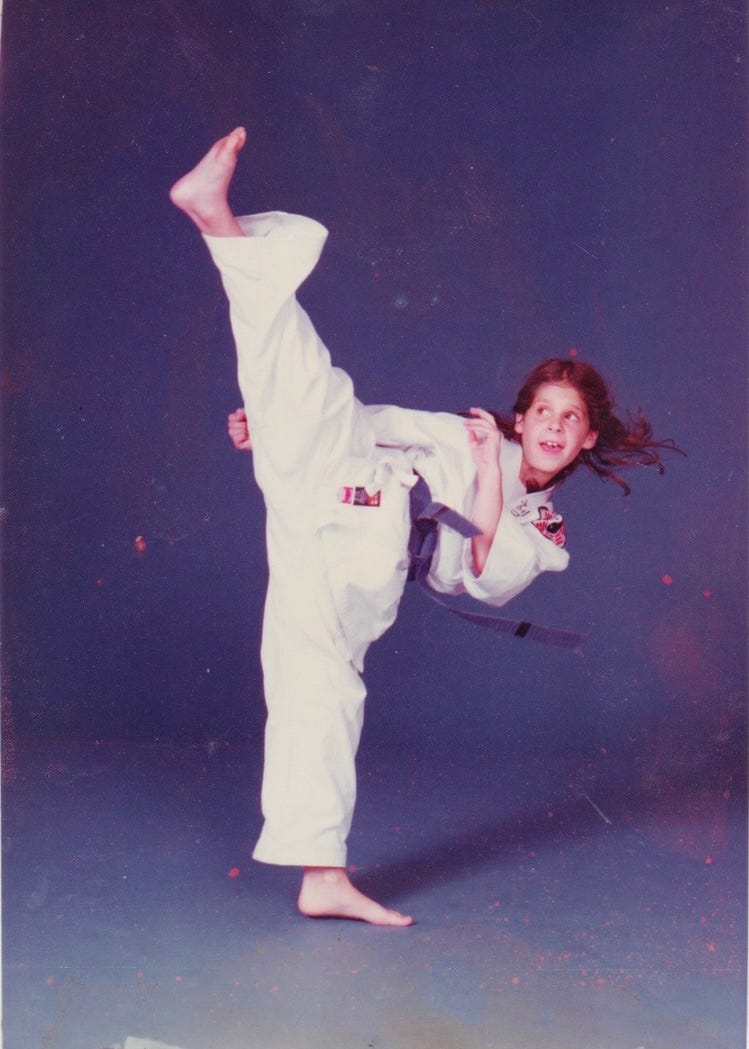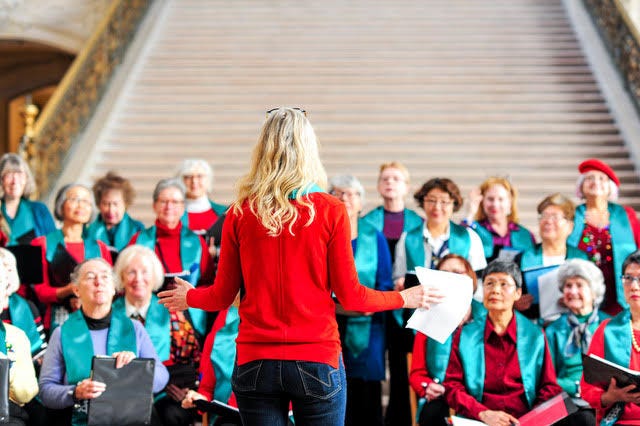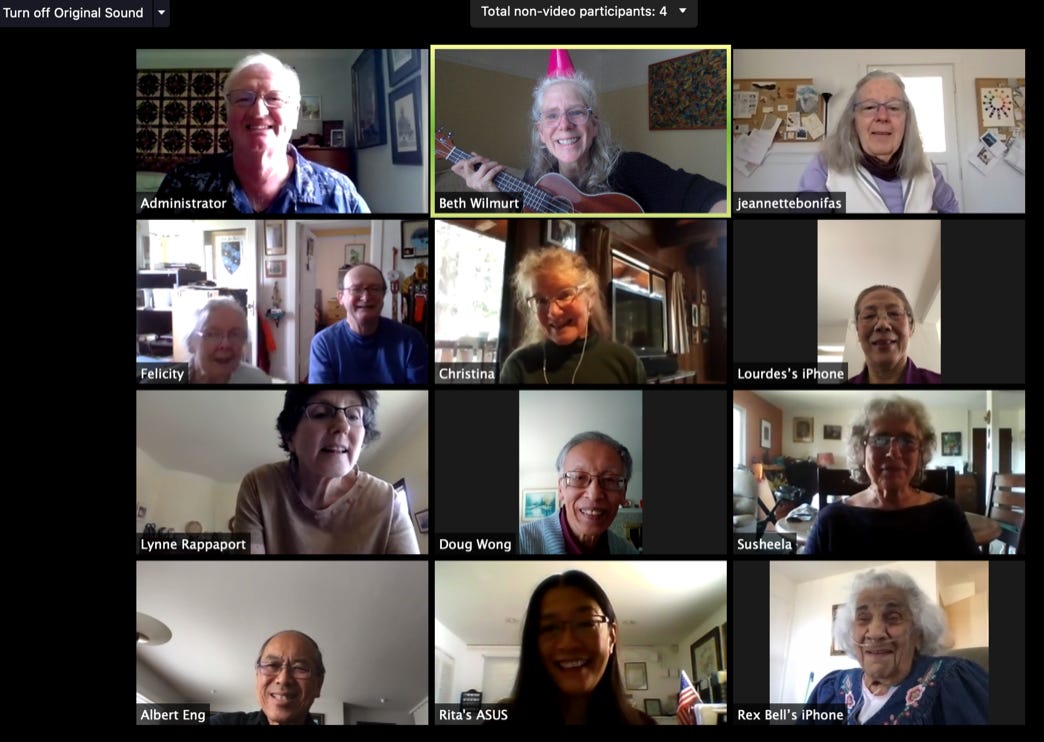MUSIC MAKES YOU SMARTER MONDAY
Back at Tap, Increasing Grey Matter with Music Lessons, My Podcast Pilot, & André Watts
In my old age, my mind gets more open, and I listen to so many different types of music and I guess that all reflects in my work. - Paul Weller
Hiya, Friends! Welcome to Music Makes You Smarter Monday.
Last weekend, after a six-year hiatus, I returned to tap class. Since then, I’ve been wandering around the house singing, “I’m back at tap” to the tune of AC/DC’s “Back in Black.” I know, I’m a dork, but tap is so much fun, I’m compelled to sing about it.
Let me tell you why I love tap. For starters, tap is technically exercise and yet, it hardly feels like a grueling workout. When I’m in class, I’m standing in front of a mirror, pretending to be Ann Miller, and at the same time, I’m strengthening my balance and coordination, and challenging my brain. #2: Tap dancing is the perfect type of movement for would-be dancers of any age. It can even be done sitting in a chair. And #3: I’ve said it before and I’ll say it again, a study in the New England Journal of Medicine found that dancing reduces the risk of dementia by 76%!
Before you get the impression that I’m a good tap dancer, let me clear that up. My class level is called “Experienced Beginners.” In other words, I’m a serial beginner. Never mind the fact that I took lessons for at least five years pre-tapbatical. Admittedly, I lacked discipline and didn’t practice enough to advance. This might be due to the fact that I took zero dance/music lessons as a child. Well, okay. Clarification: I did take a few ballet classes at age six until I got into a fistfight with my frenemy, Lisa Kaplan, during our big recital (in front of the entire school), and my ballet career came to a swift end. “That’s it! I’m signing you up for karate,” Ma said as she dragged me off the stage.
MUSIC LESSONS INCREASE GREY MATTER
I don’t know why I failed to take music and dance lessons as a kid. I love music and dancing, and I’m sure if I’d expressed interest, my mom would’ve supported the idea. A talented chanteuse, Ma dreamed of being a Broadway star and studied with Leonard Bernstein as a young lass. My father played Latin percussion instruments and was an excellent dancer. He impressed all the ladies with his fancy footwork. By rights, I should be naturally musical. No such luck. The good news is, it might be better for my brain to start music lessons right now.
As we age, the brain loses plasticity and grey matter, which leads to cognitive decline and memory loss. But according to a new study, we can actually increase our grey matter and keep our mind sharp by taking music lessons as an older adult. This is pretty much the coolest thing I’ve heard in ages. Not only can we torture, er, impress our loved ones with our amateur renditions of Chopsticks, we’ll get smarter in the process. The study was conducted among 132 healthy retirees from 62 to 78 years of age. To qualify, participants had to be music novices, with less than six months of music lessons in their lifetimes. ⬅️C’est moi!
‘‘We wanted people whose brains did not yet show any traces of plasticity linked to musical learning. Indeed, even a brief learning experience in the course of one’s life can leave imprints on the brain, which would have biased our results’’, explains Damien Marie, first author of the study, a research associate at the CIBM Center for Biomedical Imaging, the Faculty of Medicine and the Interfaculty Center for Affective Sciences (CISA) of UNIGE, as well as at the Geneva School of Health Sciences.
The participants were randomly assigned to two groups, regardless of their motivation to play an instrument. The second group had active listening lessons, which focused on instrument recognition and analysis of musical properties in a wide range of musical styles. The classes lasted one hour. Participants in both groups were required to do homework for half an hour a day. ‘‘After six months, we found common effects for both interventions. Neuroimaging revealed an increase in grey matter in four brain regions involved in high-level cognitive functioning in all participants, including cerebellum areas involved in working memory. Their performance increased by 6% and this result was directly correlated to the plasticity of the cerebellum,’’ says Clara James, last author of the study, a privat-docent at the Faculty of Psychology and Educational Sciences of UNIGE, and full professor at the Geneva School of Health Sciences. Click here to read the full summary.
Just think, if every older adult participated in a study that footed the bill for music classes, we’d become a nation of SuperAgers—people over the age of 80 with the cognitive function of a person decades younger. #SquadGoals. Wouldn’t that be something? Let’s get our senators on the horn and demand FREE music lessons for all, along with FREE healthcare. Dare to dream. In the meantime, if you’re looking for free lessons, YouTube has hundreds of instructional videos that allege they can teach you how to play an instrument in ten minutes.
HELLO CHORUS/MY PODCAST PILOT
Years ago, when I lived in San Francisco, I shared an apartment with my friend, Beth Wilmurt—an uber-talented actress, singer, theater director, playwright, and choir director for kids and older adults. Beth still lives in our old apartment with her boyfriend and, because the place is rent-controlled, she’s able to scrape by on an artist’s income in SF. I consider this a miraculous feat.
In the early days of Covid, when group singing was deemed a sure-fire way to get infected, Beth was told by her bosses that she needed to transition 100 older adult choir members from a live choir to a virtual choir on Zoom. Beth, who has always preferred an analog way of life, didn't even have wifi in her apartment.
Needs must as they say, so Beth reached out to her singers via email to measure their levels of tech savviness. She asked questions like; “Have you ever heard of Zoom? Do you have a computer? What kind?” Soon her inbox was flooded with funny and touching email replies, which provided so much comfort during a stressful time, Beth decided to turn them into songs. “Their messages were keeping me going, things like, ‘Thank you, Beth,’ ‘We can do it!’ and ‘How about an inappropriate song like [Kiss'] Want to Rock and Roll All Nite,” Beth explains. "So I grabbed my ukulele and wrote 20 songs in one night. I had the best time singing their words and thinking about them in a deeper way, musically.”
I wanted to help Beth share this heartwarming story, so in 2020, I recorded an interview with her and turned it into a podcast episode. I knew the story had to be an aural experience. Beth is a funny and excellent raconteur, and I wanted audiences to hear her wonderful songs. At the time, I’d been working on developing a pro-aging podcast called Better With Age. I recorded two episodes, proceeded to get overwhelmed/discouraged, and shelved the project for a spell. I’ve done that a lot in the past and I’m trying to turn over a new leaf.
All this to say; I’d love for you to listen to this podcast, which I’m certain will brighten your day. It’s only 24 minutes long. Turn it on in the background while you brush the dog, water the plants, or cook dinner. If you do listen, please let me know what you think and if you’d be interested in hearing more of this type of content. I recommend staying until the very end for some extra feels. Hit the arrow on the audio link below to listen.
Read more about the Hello Chorus and listen to all of Beth’s songs.
THE ICYMI OBIT OF THE WEEK: ANDRÉ WATTS

This week, let’s celebrate the life of André Watts, “one of the first Black superstars of classical music,” who passed away on July 14th at age 77. He rose to fame at 16 when he auditioned for Leonard Bernstein and blew the maestro’s mind. Later, he was invited to appear on stage and play with Bernstein and the New York Philharmonic orchestra. The performance was televised as part of Bernstein’s series of Young People’s Concerts. Side note: I’d already written the bit above about my mom studying with Leonard Bernstein before I read Watts’ obit. Call it kismet, or the universe doing its thing.
Mr. Bernstein was effusive as he introduced the young pianist to the crowd at Philharmonic Hall. “He sat down at the piano and tore into the opening bars of a Liszt concerto in such a way that we simply flipped,” Mr. Bernstein said, recounting the young pianist’s audition.
Mr. Watts was then living in relative obscurity in Philadelphia, practicing on a beat-up piano with 26 missing strings. But he emerged from his performance of Liszt’s Piano Concerto No. 1 a bona fide star.
He sometimes hummed, stomped his feet and bobbed his head while he played, and some critics faulted him for excess. But his charisma and his technical powers were unquestioned, which helped fuel his rise to the world’s top concert halls.
“My greatest satisfaction is performing,” Mr. Watts told The New York Times in 1971, when he was 25. “The ego is a big part of it, but far from all. Performing is my way of being part of humanity — of sharing.”
Click this link to read the full the obituary and to watch Watts’ breathtaking performance on the Bernstein show. This is a gift link for the New York Times so you should be able to access it even if you don’t subscribe.
IT’S TOO DARN HOT
I’m sure you’ve heard the news about the record-breaking temps around the globe so I won’t belabor the point. I just thought it would be fun to end this week’s post with a sizzling tap number by the always sassy and funny, Ann Miller from the movie, Kiss Me Kate. 🔥💕
Hit the ❤️ button or drop a line in the comments and let me know if this mic is hot. Thanks for subscribing and reading. You’re all lovely souls. xo








Thank you, Hilary! I love your posts, and this was really sings (sorry, I couldn't resist!)! Please keep writing and tapping. Your posts are a joy to read, and I always learn something new, which is very good for my grey matter! ---Clare
I loved all of this! Thanks for the inspiration.